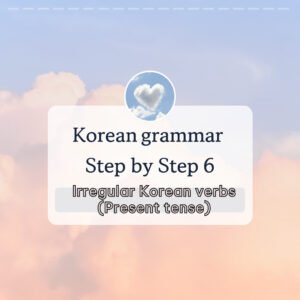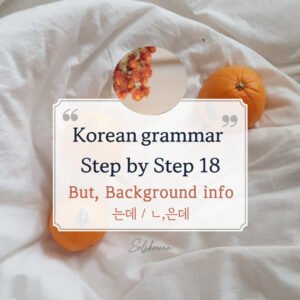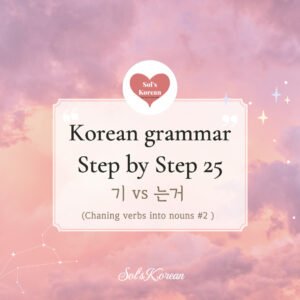Korean Future tense conjugations
Hello, language learners! Welcome back to our journey of mastering Korean.
We are already stepping into the Korean future tense conjugations, having covered all the present and past tenses. This is the last part of our tense studies—exciting! After this, we will focus on studying important grammar points one by one and putting them into practice. It will be more fun!
In this post, we’ll explore two common future conjugations: “-을 거예요” and “-을게요.” While both forms indicate future actions, they are used in different contexts and carry distinct nuances. By the end of this post, you’ll understand when and how to use each form correctly.
Let’s dive in!
Part 1,
Let’s grasp the concept of grammar
(1). ㄹ/을 거예요: “will” or “going to” in English, and it focuses on the speaker’s intention or an expected future event.
Original form: – ㄹ/을 거이다
Most common formality: – ㄹ/을 거예요 (fairly formal)
Extremely formal: – ㄹ/을 겁니다
Informal: – ㄹ/을 거야
How to Form “-ㄹ/을 거예요”
Identify the verb stem: Remove the “다” (da) ending from the verb to find the stem.
Check the verb stem’s batchim(final consonant):
If the verb stem ends in a consonant, add “-을 거예요.”
If the verb stem ends in a vowel, add “-ㄹ 거예요.”
For example
읽다 (to read)
– Remove “다” to get the stem “읽”.
– Since the stem ends in a consonant (batchim), add “-을 거예요.”
– 읽 + 을 거예요 -> 읽을 거예요 (I will read.)
자다 (to sleep)
– Remove “다” to get the stem “자”.
– Since the stem ends in a vowel, add “-ㄹ” as a final consonant and then 거예요.
– 자 + ㄹ 거예요 -> 잘 거예요 (I will sleep.)
Let’s take a look at more examples!
믿다 (to believe) → 믿을 거예요 (will believe)
* Since the verb stem (믿) ends in a batchim, we add the consonant 을 and 거예요.
* Informally, we can change “예요” to “야”. 믿을 거야!(casual)
* 너를 믿을 거예요 : I’ll believe in you.
가르치다 (to teach) → 가르칠 거예요 (will teach)
* Since the verb stem (가르치) ends in a vowel, we add the consonant ㄹ and 거예요.
* Informally, we can change “예요” to “야”. 가르칠 거야!(casual)
* 수학을 가르칠 거예요 : I will teach math.
웃다 (to laugh) → 웃을 거예요 (will laugh)
* Since the verb stem (웃) ends in a batchim, we add the consonant 을 and 거예요.
* Informally, we can change “예요” to “야”. 웃을 거야!(casual)
* 많이 웃을 거예요 : I will laugh a lot.
끝내다 (to finish) → 끝낼 거예요 (will finish)
* Since the verb stem (끝내) ends in a vowel, we add the consonant ㄹ and 거예요.
* Informally, we can change “예요” to “야”. 끝낼 거야!(casual)
* 숙제를 끝낼 거예요 : I will finish my homework.
기억하다 (to remember) → 기억할 거예요 (will remember)
* Since the verb stem (기억하) ends in a vowel, we add the consonant ㄹ and 거예요.
* Informally, we can change “예요” to “야”. 기억할 거야!(casual)
* 그날을 기억할 거예요 : I will remember that day.
Here are irregular ones:
살다 (to live) → 살 거예요 (will live)
* For verbs ending in ㄹ, we simply add 거예요! There’s no need to add 을!
만들다 (to make) → 만들 거예요 (will make)
* For verbs ending in ㄹ, we simply add 거예요! There’s no need to add 을!
짓다 (to build) → 지을 거예요 (will build)
* 짓다 is a “ㅅ” irregular verb.
If you don’t know about these irregular verbs, check out here!
깨닫다 (to realize) → 깨달을 거예요 (will realize)
* 깨닫다 is a “ㄷ”irregular verb.
If you don’t know about these irregular verbs, check out here!
듣다 (to listen to, hear) → 들을 거예요 (will hear)
* 듣다 is a “ㄷ”irregular verb.
If you don’t know about these irregular verbs, check out here!
돕다 (to help) → 도울 거예요 (will help)
* 돕다 is a “ㅂ” irregular verb.
If you don’t know about these irregular verbs, check out here!
* Note that, ㅡ and 르 irregular verbs are conjugated normally here.
바쁘다(to be busy) → 바쁠 거예요 (will be busy)
* We are adding “ㄹ” since the verb stem(쁘) ends in a vowel.
다르다(to be different) → 다를 거예요 (will be different)
* We are adding “ㄹ” since the verb stem(르) ends in a vowel.
(2). ㄹ/을게요: Indicates a future action or intention, often implying a decision made on the spot or as a response to someone.
-ㄹ/을게요” is used to express a future action with a sense of commitment or promise. It often implies that the speaker’s decision is influenced by the listener or the situation. This form is used when the speaker wants to show consideration for the listener’s input or when responding to a situation, similar to making a promise or a responsive decision in English.
Most common formality: – ㄹ/을 거예요 (fairly formal)
Informal: – ㄹ/을 거야
How to Form “-ㄹ/을게요”
Identify the verb stem: Remove the “다” (da) ending from the verb to find the stem.
Check the verb stem’s batchim(final consonant):
If the verb stem ends in a consonant, add “-을게요.”
If the verb stem ends in a vowel, add “-ㄹ게요.”
For example
읽다 (to read)
– Remove “다” to get the stem “읽”.
– Since the stem ends in a consonant (batchim), add “-을게요.”
– 읽 + 을게요 -> 읽을게요 (I will read.)
Informally, you simply drop the 요 part. 읽을게(casual)
자다 (to sleep)
– Remove “다” to get the stem “자”.
– Since the stem ends in a vowel, add “-ㄹ” as a final consonant and then 게요.
– 자 + ㄹ게요 -> 잘게요 (I will sleep.)
Informally, you simply drop the 요 part. 잘게(casual)
What’s the main difference between 을 거예요 and 을게요? I know it can be confusing, so let’s look at various examples to see when and how each one is used.
Key Differences
을 거예요 is more neutral and straightforward about future plans or actions.
을게요 often carries a nuance of immediate decision-making or responsiveness, often in the context of social interaction. (There is always a listener!)
Usage Example Comparisons
내일 일찍 일어날 거예요. (I will get up early tomorrow.)
응, 내일 일찍 일어날게요. (Yes, I will get up early tomorrow.)
* The first one simply indicates your plan or intention, regardless of whether there are listeners. The latter, however, implies a listener and is used as a response. So, if someone asks me if I will get up early tomorrow, I would reply with 일찍 일어날게요.
이번 주말에 공부할 거예요. (I’m going to study this weekend.)
알겠어요, 이번 주말에 공부할게요. (Alright, I will study this weekend.)
* The first sentence indicates your plan to study this weekend. The second sentence is a response, perhaps after someone suggested or reminded you to study.
에어컨 끌 거예요. (I’m going to turn off the AC.)
에어컨 끌게요. (If you are okay with it, I’ll turn off the AC.)
* The first sentence simply states the intention to turn off the AC without considering the listener. The second sentence takes the listener into account and suggests turning off the AC if they agree or are okay with it.
좀 쉬어. 내가 요리할게. (Get some rest, I’ll cook for you.)
* In this context, “을게요” is used because you’re addressing someone directly and expressing your intention to cook for them in response to their need for rest.
아 비와? 내가 데리러 갈게. (Oh, is it raining? I’ll come pick you up)
* In this context, “을게요” is used because you are responding to the listener’s situation (it’s raining) and offering to take action (picking them up). This form shows that you are making a decision based on the listener’s circumstances and offering help.
* 을게요 is not used in question forms!
– Will you workout today? 오늘 운동 할 거예요? (운동 할게요?(X))
– I will! (운동 할 거예요.)
* Here, for the response, “운동 할 거예요” is used because you’re stating your plan to work out. Even though you’re answering a question, this form does not imply an action taken in direct response to the listener’s situation, but rather your own intention.
“을게요” implies that your action is influenced by the listener’s situation or request.
If the context were different, such as someone expressing concern about your health, you might use “을게요” to show that your decision to work out is influenced by their concern:
Listener: “You should take care of your health.”
Response: “Okay, I will work out. 운동 할게요.”
* Here, “할게요” shows that your action is a response to their concern.
I know there is a difference between ‘be going to’ and ‘will’ in English, but in Korean, there’s no strict grammar rule distinguishing between them. You can use either 을 거예요 or 게요 depending on the situation—that’s it!
You might also wonder how to say “I will be sleeping” in Korean. One might think to combine the “고 있다 or 는 중이다” (be + -ing) form with the future tense, like “자고 있을 거예요” or “자는 중일 거예요.” While these grammar forms are correct, the meanings are different.
자고 있을 거예요 is used when guessing a situation. For example, if someone asks, “Do you know what he is doing?” you might respond, “He is probably sleeping now,” which translates to “자고 있을 거예요. or 자는 중일 거예요”
So, while both forms are grammatically correct, they are typically used to make educated guesses about what someone is doing, rather than to state your own future actions.
There isn’t a specific grammar form in Korean to express the nuance of “I’ll be studying” as in English.
Instead, we simply use the future tense (거예요).
I’ll be studying tonight : 오늘 밤에 공부 할 거예요
I’ll be traveling next month: 다음달에 여행 할거예요.
Now, let’s practice making sentences together using the past tense.
Let’s get started!






